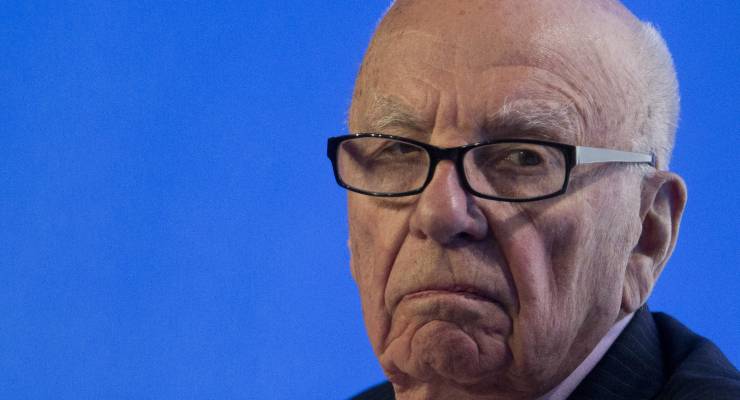
Remember when News Corp was the great disrupter? Remember when it was the young bull, forging new networks around the world with deep political influence, changing and sharpening journalism, knocking over anyone who stood in its way?
News was the future. Then, suddenly, it wasn’t. It’s become the grumpy old bull, shouting at the clouds of cultural change, ordering a stop to the disruption being wrought by big tech.
How’s that been working out these past few days?
James walks away
In a life-imitates-art taster of the next series of HBO drama Succession, the younger Murdoch brother, James, resigned from his role in the family company as director of News Corp on Saturday.
This was due, he said, “to disagreements over certain editorial content published by the company’s news outlets and certain other strategic decisions”.
In the Murdoch drama, James has played both the digital-savvy son and family conscience on climate change. Following last summer’s bushfires, he criticised the company’s Australian papers for their climate change denialism.
He’s regularly undermined the company, his brother and his father with large public donations to support climate change, anti-racism and Democrat presidential candidate Joe Biden.
James was once the company’s future. Now, his vanishing is a reminder that there’s little space for nuance in News Corp’s fight against the cultural reset on gender, race and climate.
Oder son Lachlan is now the last sibling standing. As News Corp and Fox have become Lachlan’s companies, they’ve increasingly devolved to cultural and political platforms for the right. They are far from the innovative news media they once strived to be.
Old power v new power
News Corp is also fighting a war against big tech. It’s a battle of old power versus new, and Australia’s federal government is backing the former. Why? Contacts, influence and a comfort with the devil you know.
News Corp is attempting to leverage a revenue lifeboat out of Google and Facebook — one that’s being built at arms-length through the Australian Competition and Consumer Council (ACCC) as a mandatory code between news media and the tech platforms.
As successive treasurers, Scott Morrison and Josh Frydenberg have had their hands all over it: from the original inquiry ordered by Morrison in 2017, through to Frydenberg’s intervention in May for a mandatory code, and on to last Friday with the release of draft legislation for parliament to enable the code.
The submissions to the ACCC over the code (also released Friday) reveal how much of a hand News Corp had in shaping that legislation — particularly in the process for shaking money out of Google and Facebook through final-offer arbitration if necessary.
It’s also reflected in the extensive rights it gives Australia’s news media to be consulted over the operation of the platforms’ algorithms. This includes what must be the most grumpy-old-man phrase written into Australian law: “in terms that are readily comprehensible”.
The major contribution of the government? Perhaps the proposed clause which explicitly excludes the ABC and SBS from access to any remuneration, even though the ABC is the major source of online news in Australia.
The final bellow
The content and tone of the News Corp submission (like its submission to the related ACCC inquiry on digital advertising) is infused with a sense of righteous anger.
News Corp says any claims by the platforms are “extraordinary” and “plainly wrong”; they “border on the absurd”. The submissions have a strong “and another thing” vibe to them. No perceived historic slight is left behind.
Given how central “news” has been to the 20th century media business model, traditional media struggles to accept that it is not equally central to Google’s search, YouTube’s videos or Facebook’s feed. Maybe old media is right, but it’s not supported by any hard data.
Ultimately, in the power game, money is how we keep score.
On Friday night (Australian time), the US markets gave their first reading on how they ranked old power and new. This followed the release of big tech’s quarterly revenue figures and Australia’s regulation announcements.
News Corp drifted sideways with a market value of about US$7.5 billion. In just one day, Facebook’s value jumped by about seven News Corps.








“Perhaps the proposed clause which explicitly excludes the ABC and SBS from access to any remuneration”
Wow, how far in the pocket of Murdoch is the Liberal Party?
Thin the old vs new machinations show how out of touch old news media and politicla supporters thinking that revenue can simply be directed back to NewsCorp etc.?
Firstly, how many people really rely upon a non curated Facebook news feed unless it’s shared by a friend? Conversely, as Google news aggregator can be self curated, NewsCorp content can be ignored due to paywalls and/or avoided by not accepting NewsCorp content.
Finally, cutting nose to spite face as they learnt in parts of Europe trying same regulatory strategy; media outlets were dependent upon digital giants for traffic and SEO for visibility….. restrict that, then it also restricts revenue streams…..
It reminds me of the record company dinosaurs trying to stop MP3s. I have no love for Google, Facebook or any of the conservative dinosaur media but this move is set to backfire big time. Just like the inquiries into Industry Super Funds, the Government will be kicking another own goal on behalf of Murdoch, et al.